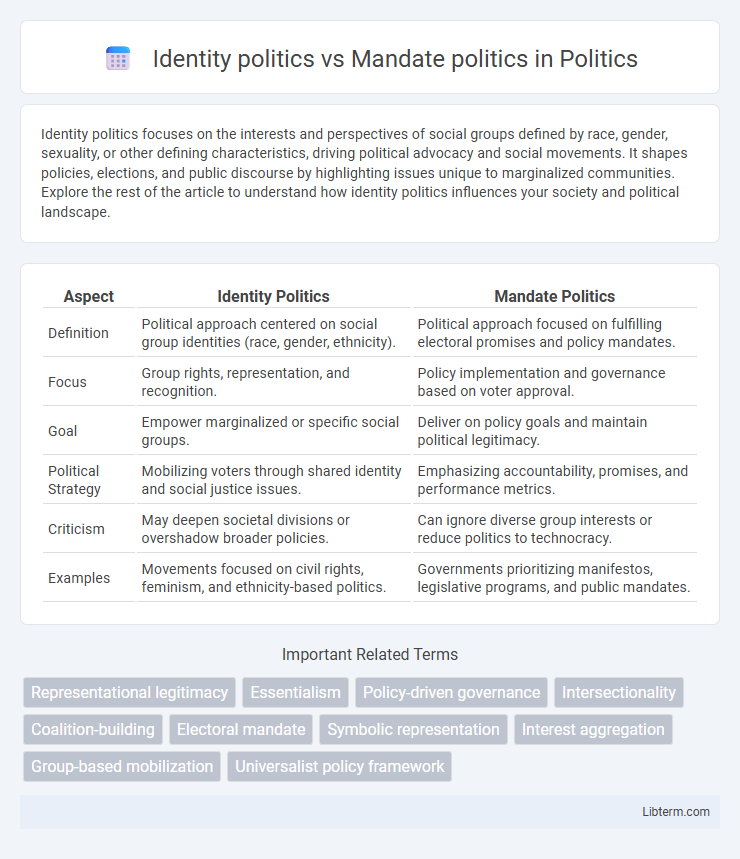Identity politics focuses on the interests and perspectives of social groups defined by race, gender, sexuality, or other defining characteristics, driving political advocacy and social movements. It shapes policies, elections, and public discourse by highlighting issues unique to marginalized communities. Explore the rest of the article to understand how identity politics influences your society and political landscape.
Table of Comparison
| Aspect | Identity Politics | Mandate Politics |
|---|---|---|
| Definition | Political approach centered on social group identities (race, gender, ethnicity). | Political approach focused on fulfilling electoral promises and policy mandates. |
| Focus | Group rights, representation, and recognition. | Policy implementation and governance based on voter approval. |
| Goal | Empower marginalized or specific social groups. | Deliver on policy goals and maintain political legitimacy. |
| Political Strategy | Mobilizing voters through shared identity and social justice issues. | Emphasizing accountability, promises, and performance metrics. |
| Criticism | May deepen societal divisions or overshadow broader policies. | Can ignore diverse group interests or reduce politics to technocracy. |
| Examples | Movements focused on civil rights, feminism, and ethnicity-based politics. | Governments prioritizing manifestos, legislative programs, and public mandates. |
Defining Identity Politics and Mandate Politics
Identity politics centers on advocating for the interests and rights of specific social groups defined by race, gender, ethnicity, religion, or sexual orientation, emphasizing the unique experiences and challenges faced by these communities. Mandate politics involves elected officials carrying out a broad policy agenda based on the electoral mandate, representing the general will of the majority rather than narrow group affiliations. The distinction between them lies in identity politics prioritizing group-specific concerns while mandate politics emphasizes implementing comprehensive policies endorsed by a majority vote.
Historical Roots and Evolution
Identity politics emerged prominently during the civil rights movements of the 1960s and 1970s, rooted in the struggle for recognition of marginalized groups such as African Americans, women, and LGBTQ+ communities. Mandate politics traces its historical roots to the concept of electoral mandates in parliamentary democracies, where elected officials claim authority to implement policies based on majority voter support. Over time, identity politics evolved to emphasize group-specific rights and social justice, while mandate politics focused on the broader legitimacy conferred by electoral victory and governance responsibility.
Core Principles and Key Differences
Identity politics centers on the representation and advocacy of specific social groups based on race, gender, ethnicity, or sexual orientation, emphasizing shared experiences and collective rights. Mandate politics prioritizes broad policy platforms and electoral mandates derived from majority voter support, focusing on governance and issue-based agendas rather than group identities. The key difference lies in identity politics' focus on group-specific concerns versus mandate politics' emphasis on universal policies and majority legitimacy.
Influences on Policy-Making
Identity politics shapes policy-making by prioritizing the interests and perspectives of specific social groups, such as race, gender, or ethnicity, leading to targeted legislation and inclusive representation. Mandate politics emphasizes fulfilling broad electoral promises and the political platform, driving policies aimed at general public approval rather than group-specific concerns. This dynamic influences the allocation of resources, legislative priorities, and the framing of political agendas in government decision-making.
Voter Mobilization and Engagement
Identity politics drives voter mobilization by appealing to shared experiences and group identities, fostering strong emotional connections that increase participation rates among marginalized communities. Mandate politics emphasizes policy promises and performance accountability, motivating voters through issue-based engagement and pragmatic evaluations of candidate platforms. Effective voter engagement often combines identity-based solidarity with clear policy mandates to maximize turnout and sustained political involvement.
Representation and Inclusivity
Identity politics centers on representing specific social groups based on ethnicity, gender, or sexual orientation, emphasizing inclusivity for marginalized communities within political discourse. Mandate politics prioritizes broad policy platforms and mandates derived from electoral majorities, focusing on inclusive governance that transcends group identities to unify diverse populations. Effective representation in democratic systems balances identity-based inclusivity with mandate-driven accountability to ensure fair participation and policy responsiveness.
Criticisms and Controversies
Identity politics often faces criticism for fostering division and prioritizing group interests over common societal goals, which opponents argue can undermine social cohesion and create echo chambers. Mandate politics is controversial for its potential to overlook minority rights and dissenting voices by assuming broad electoral endorsements justify sweeping policy decisions. Both approaches provoke debate around representation, legitimacy, and the balance between individual identities and collective governance.
Impact on Democratic Processes
Identity politics emphasizes group-specific interests and social identities, potentially fragmenting the electorate and challenging universal democratic principles. Mandate politics centers on policy platforms and electoral promises, promoting accountability and coherent governance aligned with voter preferences. The tension between identity and mandate politics shapes democratic processes by influencing voter behavior, representation, and political polarization.
Global Case Studies and Examples
Identity politics emphasizes the representation of specific social groups based on race, ethnicity, gender, or religion, seen in movements like the Black Lives Matter protests in the United States and the Dalit movement in India. Mandate politics centers on broad political promises or policy platforms aimed at general governance, exemplified by Emmanuel Macron's centrist agenda in France and Jair Bolsonaro's campaign focusing on law and order in Brazil. Global case studies reveal that while identity politics mobilizes marginalized communities, mandate politics appeals to wider electorates by promoting inclusive policy changes.
Future Trends and Implications
Future trends indicate a growing polarization as identity politics increasingly shapes voter behavior, emphasizing group-specific issues and cultural representation. Mandate politics may adapt by incorporating inclusive policy platforms that address diverse identities while maintaining broad governance goals. The implications suggest a shift towards hybrid political strategies balancing identity recognition with consensus-driven mandates to ensure electoral success and social cohesion.
Identity politics Infographic

 libterm.com
libterm.com